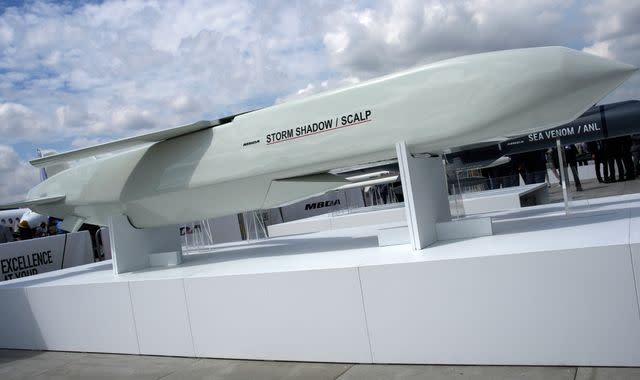Keir Starmer gives go-ahead for British missiles to be used in strikes against targets inside Russia

Sir Keir Starmer has told the Ukrainian president that British missiles can be used for defensive strikes against targets inside Russia.
The announcement came as the new British prime minister met Volodymyr Zelenskyy at the NATO summit in Washington DC on Wednesday.
The decision over the Storm Shadow missiles, which has been welcomed by Ukraine, represents a hawkish shift in policy from the stance taken by the former Conservative government.
Signalling the move, but declining to get into "operational arrangements", John Healey, the new defence secretary, told Sky News that Britain "will do all we can to help Ukraine in their fight to repel Putin's invasion".
Speaking in Washington, Mr Healey said: "We provide weapons equipment where we can for them to defend themselves, and as we do for ourselves and any other nation in conflict, we require, because it's international law, that war is conducted within those rules of the Geneva Convention."
Meanwhile, Mr Starmer said the military aid would be used "in accordance with international humanitarian law".
He said: "It is for defensive purposes, but it is for Ukraine to decide how to deploy it for those defensive purposes. I don't mean to get into a discussion here, as you would imagine, all targeting that would be inappropriate, but that is the position."
In a post on X after the meeting with Sir Keir, President Zelenskyy said: "This morning, I learned about the permission to use Storm Shadow missiles against military targets in Russian territory.
"Today we had the opportunity to discuss the practical implementation of this decision. I'm grateful to the UK for its unwavering support for Ukraine and our people."
However, reacting to the news, Russian President Vladimir Putin's spokesman said: "If this is so then, of course, this is another absolutely irresponsible step towards escalating tensions and seriously escalating the situation."
Dimitry Peskov told Reuters: "We will be watching this very thoroughly and respond accordingly."
A NATO summit with distinct focuses
The significant announcement formed one strand of a NATO summit with many distinct focuses.
The gathering of the leaders of the 32-member states, concludes on Thursday, and marks the 75th anniversary of the defence alliance.
In a lengthy declaration, the alliance's members announced that Ukraine was on an "irreversible" path to NATO membership, with wording important to the Ukrainian government, but likely to agitate Moscow.
"We fully support Ukraine's right to choose its own security arrangements and decide its own future, free from outside interference. Ukraine's future is in NATO," the declaration said.
It continued: "As Ukraine continues this vital work, we will continue to support it on its irreversible path to full Euro-Atlantic integration, including NATO membership. We reaffirm that we will be in a position to extend an invitation to Ukraine to join the alliance when allies agree and conditions are met."
Defence Secretary Mr Healey said that the UK should be "the leading European nation in NATO" and added that it must take the leading role in Ukraine.
In an unusual signal of political continuity concerning weapons supply to Ukraine, he said: "The Sunak pledge comes with the Starmer guarantee of delivery."
Asked about the possibility of a second Donald Trump presidency, Mr Healey said more "heavy lifting" could be necessary, in carefully calibrated comments.
"Whoever is elected to the White House, we have to recognise that the American priorities are likely to shift increasingly to the Indo-Pacific and to other parts of the globe," he said.
"The consequences of that are the European nations in NATO must do more of the heavy lifting and some of the leadership that traditionally we've been able to look to the Americans to do."
Privately, Washington-based European diplomats are more candid, saying that the existing but gradual rebalancing of NATO's power could morph into a brutal shift away from US dominance of the alliance in a Trump second term.
Summit overshadowed by concern for US leader
The summit has been overshadowed by the storm over President Biden's agility and perceived cognitive decline. The call for him to stand aside as candidate by his friend and megadonor George Clooney added significant pressure.
Today, Senate Democrats will have lunch with top Biden advisers Mike Donilon and Steve Ricchetti, as well as the Biden-Harris campaign chair Jen O'Malley Dillon.
It comes hours before the president gives a rare news conference to conclude the NATO summit. It will represent the latest huge test to prove his capability.
The president looked tired but was free of slip ups at his meeting in the Oval Office with Prime Minister Starmer. It came halfway through Sir Keir's visit to Washington which UK diplomatic sources have described as a real success.
It was a fortuitous gift of timing that the three top ministers of the new British administration could meet so many of their respective opposite numbers in one place on week one of their new government.
Sir Keir, with Foreign Secretary David Lammy and Defence Secretary John Healey appeared frequently as a trio and visited Capitol Hill where they met the leaders on both sides of the political divide.


